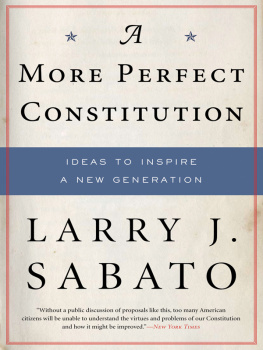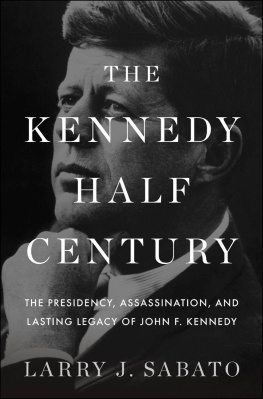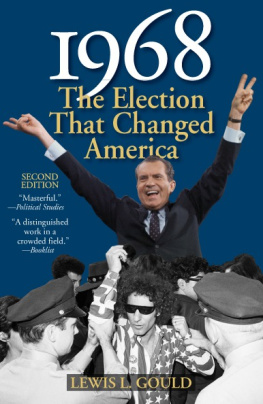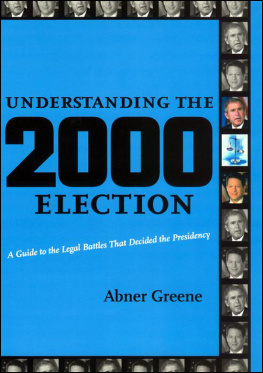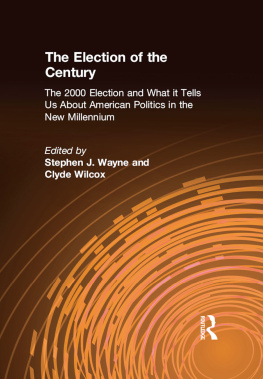Alan I. Abramowitz is the Alben W. Barkley Professor of Political Science at Emory University and a senior columnist for Sabatos Crystal Ball. His most recent book is The Great Alignment: Race, Party Transformation, and the Rise of Donald Trump.
David Byler is a data analyst and political columnist for the Washington Post Opinions Section. He was previously the Chief Elections Analyst at the Weekly Standard and an elections analyst at RealClearPolitics.
J. Miles Coleman is associate editor of Sabatos Crystal Ball, the University of Virginia Center for Politics nonpartisan newsletter on American campaigns and elections. A political cartographer with a portfolio of thousands of maps, hes studied American electoral geography for over a decade.
Rhodes Cook was a political reporter for Congressional Quarterly for more than two decades and a senior columnist at Sabatos Crystal Ball. He is the author of The Presidential Nominating Process: A Place for Us?, which was published by Rowman & Littlefield.
Theodore R. Johnson is a senior fellow and director of the fellows program at the Brennan Center for Justice. Hes written on black political behavior for the New York Times Magazine, The Atlantic, and the Washington Post, among other national publications. Previously, he was a fellow at New America and a naval officer.
Kyle Kondik is managing editor of Sabatos Crystal Ball, the University of Virginia Center for Politics nonpartisan newsletter on American campaigns and elections. He is the author of The Bellwether, a history of Ohios presidential voting, and is working on a second book, The Long Red Thread, a history of modern U.S. House elections.
Mary Frances McGowan is the gubernatorial and state legislative elections reporter for National Journal. Prior to joining National Journal, she was a Tim Russert Fellow with Meet the Press and a researcher at NBCs Washington Bureau.
Diana Owen is Associate Professor of Political Science at Georgetown University and teaches in the Communication, Culture, and Technology graduate program, and he has served as director of the American Studies Program. She is the author of Media Messages in American Presidential Elections; New Media and American Politics (with Richard Davis); and American Government and Politics in the Information Age (with David Paletz and Timothy Cook).
Grace Panetta is a senior politics reporter at Business Insider covering politics with a focus on elections, voting rights, and election administration. Grace closely covered voting during the COVID-19 pandemic, and played a leading role in Business Insiders live results coverage of all of 2020s elections in partnership with Decision Desk HQ.
Madelaine Pisani has covered politics for National Journals Hotline team since 2018, working on both the Senate and gubernatorial beats.
Larry J. Sabato is the Robert Kent Gooch Professor of Politics at the University of Virginia and director of its Center for Politics. He is the author or editor of more than 20 books on American politics and elections.
Michael E. Toner is former chairman of the Federal Election Commission and is chair of the Election Law and Government Ethics Practice Group at Wiley LLP in Washington, DC.
Karen E. Trainer served in the FECs Reports Analysis Division and is a senior reporting specialist at Wiley LLP.
Sean Trende is the senior elections analyst for RealClearPolitics. He is the author of The Lost Majority: Why the Future of Government Is Up for Grabs and Who Will Take It, and he coauthored the Almanac of American Politics 2014.
Lots of unexpected things have happened in America since Donald Trump was elected president, and among the most unexpected is that the 45th president was so different, so abrasive, and so contemptuous of many cherished traditions and norms that by 2020 an exhausted electorate was ready to revive a slogan from 100 years ago. After World War Is death and destruction during the two terms of President Woodrow Wilson, Americans were prepared for what Republican presidential nominee Warren G. Harding called a return to normalcy. Harding had read the peoples mood accurately, and he won the 1920 election in a landslide. Other than inventing the word normalcy, Harding made little impact on history in a positive way, becoming better known for the Teapot Dome scandal, his mistress and out-of-wedlock child, and an early death after just two years and five months in the White House.
Comparisons are strained where Donald Trump is involved. Thats because Trump is unlike any of his predecessors. From his first day in the White House to his last, the 45th president did it his way, and he won not just the support but also the devotion of tens of millions of his fellow citizens. Those in his base, as it was often called, backed Trump no matter what, and did so in what can only be described as a near-religious fervor. That Trump was undeniably authoritarian, demagogic, narcissistic, often untruthful, and ignorant of most of the governments functions made not a whit of difference to those in the Trump cult.
Trumps election and style of governance was enough to shake the faith of many people at home and around the world in the U.S. system of government and politics. What kind of system and electorate permits this sort of individual to ascend to the most powerful position, arguably, anywhere? What of the nations vaunted checks and balanceswhich failed time and again to rein Trump in? The anti-majoritarian momentum in the United States, fed by the Electoral College that twice in 16 years clashed with the popular vote, as well as the U.S. Senate that heavily overrepresented little-populated rural states, was part of the answer. So too was extreme partisan polarization between Republicans and Democrats, two groups that increasingly appeared to have little in commonall but negating comity in Congress as well as pieces of the Constitution such as the 25th Amendment, ratified in 1967 to remove a dangerous or incapable president via bipartisan actions by the Congress and Cabinet.
All this might have worsened in a second Trump term, which many observers believed was at least an even bet or perhaps probable as the election year dawned. The economy was solid, there were no unpopular foreign wars, and Americans seemed almost numb to the constant chaos, insults, and outrages flowing from Trumps White House.
But then two significant developments changed the equation to Trumps disfavor. First came the pandemic. The COVID-19 public health crisis brought illness and death around the globe, but the Trump administrations mismanagement of the countrys responsefed by the presidents insistence that the disease wasnt particularly serious and could be obviated by warm weather, bleach, and medications unproven to workresulted in a death toll considerably higher than it had to be. The damage to the economy was serious as soon as lockdowns began in March 2020, and Trump lost the punch of his main talking point in his reelection bid. The pandemic roared right through the November election (and beyond). The economy in some sectors all but collapsed, despite serious rescue packages at the federal and state levels. The advent of effective vaccines, the only real long-term hope to end the pandemic, did not occur until after the election.
The second election-changing development was the nomination of former Vice President Joseph R. Biden Jr. as the Democratic presidential nominee. While there were quite a few attractive, thoughtful, and reasonably well-qualified candidates in the Democrats field of nearly 30 contenders, Joe Biden was unquestionably the safest choice. His long 36-year career as a U.S. senator and eight years as President Obamas vice president made him one of the most tested White House nominees in modern times. Like many politicians, Biden evolved ideologically over his decades in public office, but the long view suggests his orientation is essentially moderate-liberal, and his rhetoric is much less heated than most of his younger colleagues. No one could credibly charge that Biden was unprepared to be president. Biden simply did not frighten most people and didnt cut any sort of extreme figure. For Biden, the pandemic eased the burdens of typical campaigning. Vigorous stumping was impossible, the national party conventions were all but virtual, and the chances for verbal gaffeswhich had long been a Biden staplewere minimized. As a 77-year-old candidate (who turned 78 just after the election), Biden was spared a great deal of physical stressand so was Trump, age 74, so the two oldest major-party nominees ever could at least be well rested.


